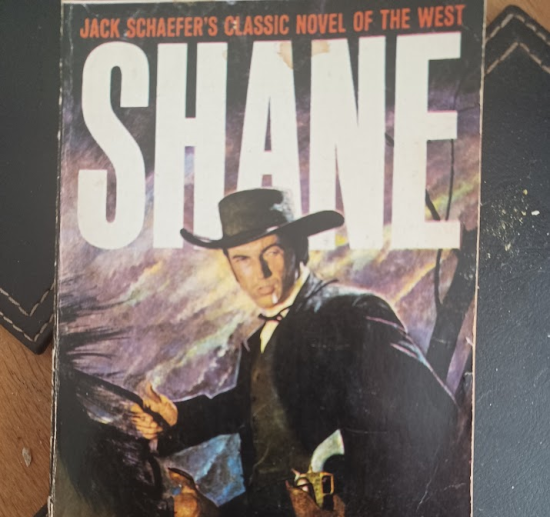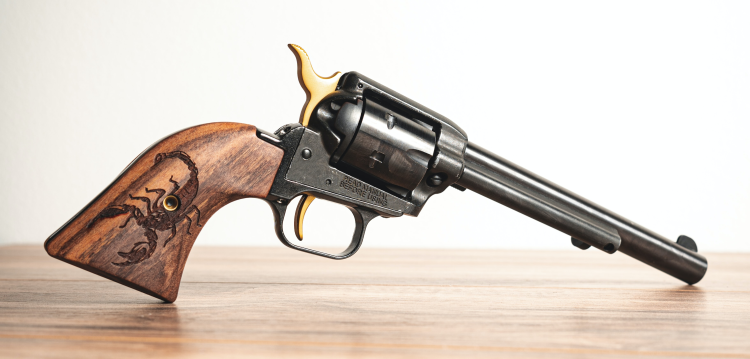I just seen the film again and must reread the book. I am surprised at some of the positive reviews, as I consider the film disappointing, certainly so when compared to the book. At the centre of my hesitancy is two things, the portrayal of Shane by Alan Ladd and the acting competence of Brandon de Wilde who plays Joey, the family’s son and the protagonist of the book, if not the film. Much of my problem with Alan Ladd is physical, he’s too clean, and does not appear dangerous enough, and certainly not at first sight. (Has my expectations of the arriving stranger been set for ever by Eastwood/Leone’s “Fistful of Dollars”).
I feel that Shane’s past, his reputation, and his desire to leave it behind is also underplayed, partly because some of it is exposed in poorly acted, at least on one side, conversations with Joey. The sexual/romantic tension between Marion and Shane is also, in my view, underplayed, I feel because of its time, and what they could then show in the movies. Not that I need to see them shagging, which would be wrong as it is not part of the story; possibly, those commentators that say her attraction was to him and was resisted due to Shane’s sense of honour and love for Joe are right.
It all comes right in the end, the honourable stranger, kills the homesteader’s nemesis and their hired gun, moves on, and the nuclear family, we assume lives happily ever after and the town becomes a peaceful law-abiding community, foretold by Chris’s epiphany which is more clearly stated in the book where he becomes the Starret family’s hired hand. I think that this is more hopeful and closer to the author’s intent than alternatives explored in Barham’s recent review; the story is told by Joey and I think the pessimistic outcomes suggested in that review, are not part of the story Schaeffer wrote.
The imagery of Fistful of Dollars seems appropriate, the motive of money in Fistful, if not Yojimbo is not; although the there’s the release of Marie Sol, an act of honour on both films, but the story is Kurosawa’s and comes from Japan. It’s not quite right, the themes of a man trying to leave a dark past behind him and build a better future, is better reflected in the Outlaw Josie Wales. I also rewatched Pale Rider, and am taken aback by the number of people who can’t see Shane in the story and revisit the mysticism of High Plains Drifter where the protagonist is either the most real ghost ever, or possessed by the spirit of the dead Marshall. On the other hand, Josey Wales is the story of a war tired warrior trying to create a family home and eventually leave his violence behind him. In this case, he survives the confrontation with the biased law chasing him, in Shane we are unclear, but Shane has to move on.
Perhaps it’s not possible to watch this post war film, released in 1953, with 21st century eyes, but I have always felt there’s something off about it. Alternatively, it’s another proof point for not watching a movie of a book you love.
Read the book!

I think I must have read the book first, as I agree with Roger Ebert, Alan Ladd is too clean, if not pretty and the buckskins are wrong (and again too clean). I also think Ladd lacks the aura of dangerousness. Ebert would seem to agree, and says
There are intriguing mysteries in “Shane,” puzzles and challenges, not least in the title character and the way he is played by Alan Ladd.
Over the last couple of years the decline of the Western and its part in the politics of the USA have come under review. An article from Marc Barham, places the film firmly in the category of a political diatribe, and the author ends the review with a highly critical view of the flawed coming of the American dream. Barham also places the homesteaders vs. ranchers in the context of the theft of land from native Americans; from his point of view, justice was on neither side. This is a view examined by the Cynical Historian on Youtube, in a piece called, When the Western Genre Perished, 1968-75 who also centres his focus on the making of the frontier and the genocidal conflict with native Americans. There are others. There are also those who disagree, see Eric Monkonnen’s review of “Gunfighter Nation” on which much of this critique is based, the book not the review.
Many westerns contained a cold war message, but some would argue that in Shane the need for lethal violence comes from another ideology. While it was an early example of this narrative, it is part of a desire to sanctify the individualism of justice in the USA while ignoring the oppression of native Americans who were the original custodians of the land. Possibly it’s the victory and need for skill in violence that the cleanliness and politeness undermine. There’s something deeper to be written about how a nation, coming from the ultra-legal response to the Boston massacre, the creation of a republican constitution of laws developed such an individualistic, and self-justifying, scofflaw, might is right, approach to law and order. We can see forces that would take advantage of this in the USA today, I wonder if they can restore the original ideas of equality (albeit then, only for some) before the law.
There’s no question to me that aspects of the book were amended for the film to make it suitable for a 1950’s audience. The [American] civil war slurs used to provoke one of the homesteaders into a gun fight have replaced the insult that the farmer had native American blood from the book, although I wonder why? The Searchers did not shrink from this racism. On re-watching I had wondered about that part of that scene. What were ex-Confederate fighters doing so far North in Wyoming, and in the film, Shane uses the same albeit reversed slurs. In the book, this is not what happens,
“What you want Wilson, and what you get are two different things you’re killing days are done. Wilson had it now. You could see him grasp the meaning. This quiet man was pushing him just as he had pushed Ernie Wright. As he measured Shane, it was not to his liking. Something that was not fear but a kind of wondering and baffled reluctance showed in his face. And then there is no escape, for that gentle voice was pegging him to the immediate and implacable moment. “I’m waiting, Wilson. Do I have to crowd you into slapping leather?”
Shane – Jack Schaeffer
Even in 2008, when in California, I found colleagues in the US company I was working for who had difficulty with a Brit using ‘Yank’ for American; the memories are still live it would seem and the film was made less than 100 years after the ACW.
One thing that Barham might have wanted to pick up, is that the location of the town in ‘Dollars is indeterminately in Mexico or the USA. If in the USA it will have recently been acquired from Mexico and the role of those tied to the land in Fistful is merely that of observers.

They argue that telling the story from Joey’s eyes is an important part of the story; as said I think Brandon de Wilde’s acting lets the film down. And while this review gets the story, I am not sure it’s the one the film tells but this quote nails what it should have been,
Though Alan Ladd was never formally recognized for his performance, the innate sadness and complexity he brings to the title role is key to the film’s success. He subtly embodies the plight of a lonely man who cannot escape his past, however hard he tries.
Pingback:Shane – davelevy . info / wiki
Someone suggested to me that the metaphor of the returning warriors of WW2 is an important lense through which this should be reviewed, at least the film.